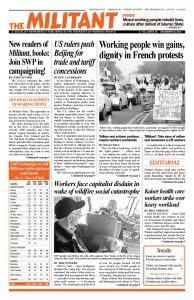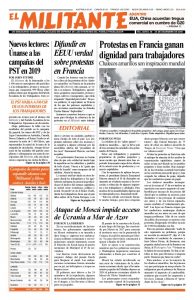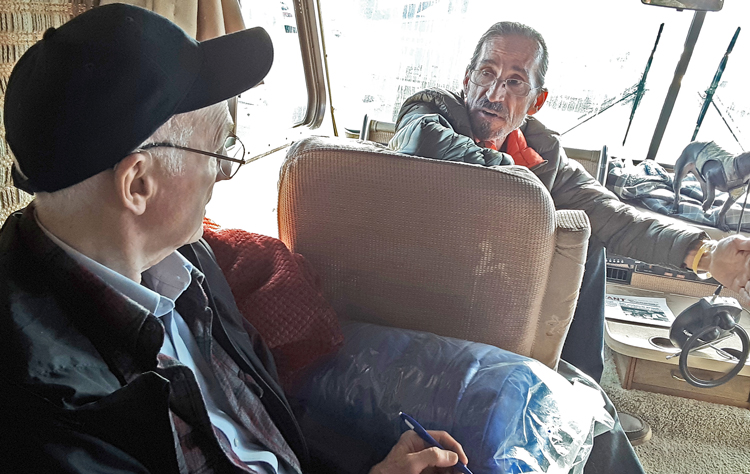CHICO, Calif. — Since firefighters declared the Camp Fire 100 percent contained, the extent of the social catastrophe that accompanied the blaze — a product of the dog-eat-dog capitalist profit system — is becoming clearer. The catastrophe took the lives of over 80 people, burned 153,000 acres, forced over 50,000 people to flee, destroyed 14,000 houses, and almost completely obliterated the towns of Paradise, Magalia and Concow.
Many of those who lost their homes and belongings took refuge in Chico, the nearest town that hadn’t been torched. Shelters and camps were set up where thousands got housing and hundreds of workers and students volunteered to provide food and aid.
On Dec. 7 a team of Socialist Workers Party members from Oakland expressed solidarity and met workers at the Silver Dollar Fairgrounds. It’s the only Red Cross shelter in the area and home to 500 people.
RVs and cars with people living in them dot the parking lot. Carpenter Tony Worino, 63, welcomed the SWP campaigners into his RV. “My clients for finish carpentry have all been burned out,” he told us, saying he would have to move.
“How do so few people control everything and manipulate us?” he asked. “For the rich we are just consumers.”
“Working people face a dictatorship of capital,” SWP member Joel Britton said. “But we have the numbers and the capacity to wage struggles to rebuild a fighting labor movement and fight for a workers and farmers government.”
We also met Ramiro Ariaz Jr., who is living in a pickup truck. “It’s hard living here. Lunch was yogurt, a fruit cup and an apple,” he said. “I applied to the Federal Emergency Management Agency three or four times and they haven’t given me anything.”
FEMA officials made a big deal Dec. 6 about how they were bringing housing to an RV park outside of Corning. It turned out to be a grand total of 12 trailers.
Knocking on doors in Chico
We also knocked on workers’ doors in Chico.
“There was only a 1 percent vacancy rate in town before the fire,” building maintenance worker Kenny Hicks said. “There is hardly any place available to rent. This is a college town — California State University is here. When the students vacate their apartments this summer they’re going to be snapped up by people who lost their homes in the fire. There will be no place for the students when they return.”
We met Julie Whited at the front door of a nearby house. She was living in Paradise when the fire broke out. She lost everything. Whited is a counselor at the Catalyst women’s shelter in Chico, where she’s worked for 20 years. Friends in town gave her a place to stay.
“I work nights and went to bed at 4 a.m., so I was asleep when my son called on the morning of the fire,” she said. “I thought it was still night because it was black outside. He told me I had to leave. I grabbed a few things and drove out of town.”
“I don’t have renters’ insurance. I applied to FEMA for help. I’m lucky, they got back to me fairly quickly and cut me a check for $894 for rental assistance,” she said.
Whited and other workers at the women’s shelter organized to join the Communications Workers of America union. “After we got the union, my wages immediately went up. I had been working eight hours a night but they had only been paying us for five. They said we were sleeping and we didn’t deserve the money,” she said. “The union got back pay for us, plus more money per day.” The union is also helping with emergency relief she said.
Whited and Evan Shuman, an agricultural worker in the neighborhood, got subscriptions to the Militant. Shuman also bought Is Socialist Revolution in the US Possible? by Socialist Workers Party leader Mary-Alice Waters.
A few houses down the street Francisco Bailon, a student at Chico High School, answered the door. “I’m in the choir at school,” he said. “The head of the choir from Paradise High asked if we would be part of a tour he was arranging for high school choirs to tour local towns to bring joy to people hurt by the fire. Everybody volunteered.”
Rebuilding twisted by capitalism
It will be a long, slow and expensive process before homes in Paradise are rebuilt. Everything involved will be twisted and distorted by the profit system.
The land has to be cleared of debris. Builders have to be found and prices agreed to. There is a shortage of construction workers, many who used to live in the area. FEMA will never help workers really recover.
In last year’s Tubbs Fire, in the Santa Rosa area, 5,600 homes were destroyed. So far only 200 have been rebuilt.
Camp Fire began under Pacific Gas and Electric Company’s high-voltage transmission lines, its likely cause. The lines were built in 1919 above the resort town of Pulga close to Paradise. The company reported problems there right before the fire. Some towers on the line were replaced in 2016, but that one was not.
PG&E has been hit by dozens of lawsuits and judgments of millions of dollars over responsibility for recent wildfires. The bosses had judged it better to pay people off than make repairs to aging equipment or keep areas around wires clear of tinder.
The same thing is happening again with Camp Fire. Recently passed laws in California allow PG&E to pass costs from legal judgments along to customers in higher rates. In the last seven years monthly bills for PG&E electricity have soared 46 percent.


